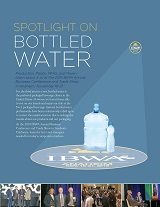On January 5, 2011, the Environmental Working Group (EWG) issued a report critiquing — in scorecard form — the information on bottled water product labels. Provided below are IBWA’s comments and responses to some of the many false and misleading statements in the report.
* The “grades” assigned to various the bottled water brands are based solely on EWG’s subjective and irrelevant criteria.
* The EWG report found absolutely no violations of any federal labeling laws and regulations. And contrary to EWG’s claim, there is no source labeling requirement in California.
* Bottled water is a safe, healthy, and convenient product that is comprehensively regulated
at both the federal and state level. Federal law requires that the U.S. Food and Drug Administration’s
(FDA) bottled water regulations be as protective of the public health as the U.S. Environmental
Protection Agency’s (EPA) tap water standards.
* Bottled water products – whether from groundwater or public water sources – are produced utilizing a multi-barrier approach. From source to finished product, a multi-barrier approach helps prevent possible harmful contamination to the finished product as well as storage, production, and transportation equipment. Measures in a multi-barrier approach may include one or more of the following: source protection, source monitoring, reverse osmosis, distillation, micro-filtration, carbon filtration, ozonation, ultraviolet (UV) light or other safe and effective methods. Many of the steps in a multi-barrier system may be effective in safeguarding bottled water from microbiological and other contamination.
* The FDA has strict bottled water Standards of Identity providing uniform requirements and definitions for the following bottled water classifications: bottled, drinking, artesian, groundwater, distilled, deionized, reverse osmosis, mineral, purified, sparkling, spring, sterile and well water.
* FDA has established Standards of Quality for more than 90 substances. Most FDA bottled water quality standards are the same as EPA’s maximum contaminant levels (MCL) for public water systems. The few differences are usually the result of the substance not being found in bottled water or the substance is regulated under another provision of law such as FDA’s food additives program.
* IBWA believes that consumers have a right to know what is in their bottled water products.
All packaged foods and beverage products, including bottled water, have extensive labeling requirements, including a statement of identity, compliance with the applicable definitions in the Standards of Identity, ingredient labeling, name and place of business of the manufacturer, packer or distributor and if required, nutrition labeling. In addition, most bottled water products also have a phone number and/or website address on the label. This contact information allows consumers to get any additional information that they may want that is not already on the label.
* If a consumer contacts a bottled water company about his or her bottled water brand and doesn’t get the information that he or she needs, the consumer can and should choose a brand of bottled water that provides the requested information. However, a consumer cannot choose what tap water comes into his or her home, which is why the Consumer Confidence Report (CCR) requirement is in place for tap water but is not necessary for bottled water.
* IBWA agrees with the FDA’s conclusion that placing all of the information contained in the Consumer Confidence Reports (CCRs) provided by public water systems on bottled water labels is not feasible for many reasons, including limited available space.
* If a bottled water product’s source is a municipal water system and the finished bottled water product does not meet the FDA Standard of Identity for purified or sterile water, it must indicate on the label that it comes from a public water system source.
* IBWA is proud of the bottled water industry’s many efforts to reduce its environmental footprint. The total weight of half-liter PET bottled water has declined by 32% over the past eight years. During this time span, more than 1.3 billion pounds of PET resin has been saved by the bottled water industry through container light-weighting.
* According to the U.S. EPA, PET plastic bottled water containers make-up just 1/3 of 1 percent of the U.S. waste stream.
* The bottled water industry has also improved the recycling rate of its containers, now at 31%, the highest rate for any plastic bottle container in single-stream curbside recycling programs. The rate of recycling for bottled water containers has doubled in the past five years.
* Bottled water companies’ efforts at attaining a lighter environmental footprint also include using more recycled PET plastic (rPET) in its bottles; using biodegradable and compostable containers, and introducing hybrid trucks to delivery fleets.
* Bottled water containers, as with all food packaging materials, must be made from FDA-approved food contact substances. Thus, the plastic and glass containers that are used for bottled water products have undergone FDA scrutiny prior to being available for use in the market place. FDA has determined that the containers used by the bottled water industry are safe for use with food and beverage products, including bottled water, and that they do not pose a health risk to consumers.
* Bottled water’s popularity with consumers for everyday personal hydration and its leading role in emergency preparedness gives it an important place in society. Given the high rates of diabetes, heart disease and obesity in the United States, any efforts to discourage consumers from drinking water – either bottled water or tap – are not in the public interest.



























